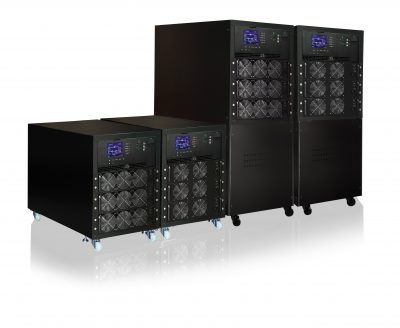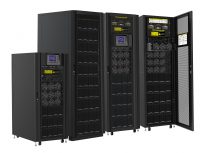Modular UPS systems provide flexible and redundant protection against critical load power failures, this is achieved through a combination of batteries and hot-swappable UPS modules located within the same chassis.
This modular concept allows to easily increase the capacity and reliability of the UPS by adding additional modules. As a result, the redundancy guarantees that the system and site operation will not be affected even if one module fails, something that cannot be achieved with standalone systems.
Below we can find some of the biggest advantages of Modular UPS systems:
High-Density UPS Design
Standalone UPS units are usually large, heavy, and can take up a lot of space because they must be extended horizontally on the floor. Modular UPS systems on the other hand are typically assembled vertically on the rack resulting in more power on less space, and since they can be separated and assembled back at their destined location, the cost of their delivery can also be significantly reduced.
Redundancy
Modular UPS systems are designed to minimize the chance of failure in critical power applications by increasing redundancy in a more flexible way. The option of adding an extra module to be designated as redundant allows the system to automatically switch to it in case any of the modules fail, guaranteeing a minimum N+1 redundancy without having to purchase an additional UPS system.
Availability
UPS systems must work continuously to ensure an uninterrupted flow of energy, but as with any mechanical piece of equipment, they are susceptible to technical failures. By providing N+1 redundancy the system guarantees that it will continue to work even if there is a malfunction in one of the modules. In addition, modular systems offer the possibility of removing and changing a defective module without having to disconnect the entire UPS for maintenance, ensuring maximum availability.
Scalability
The design of the Modular UPS system offers the flexibility to expand its capacity by adding more individual modules to satisfy an increase in demand. To express this more clearly, if the site has a 60KVA load and the customer purchases an 80KVA modular system with 4 20KVA modules, the operational running costs will be less than that of acquiring 2 6OKVA standalone parallel systems while maintaining an N+1 redundancy. Furthermore, if the site load requirement increases from a 60KVA to an 80KVA load, the customer can simply add an additional 20KVA module to comply with the new demands.
Lower Total Cost of Ownership
To calculate the Total Cost of Ownership of buying a UPS, the customer must take into consideration the upfront cost of the equipment, installation cost, its annual energy use, as well as other lifetime operational costs. Solomon’s modular systems offer high efficiency, ease of installation and maintenance, a flexible battery configuration that adapts to different applications, and unity output power factor. Solomon’s modular design also lowers the Mean Time to Repair and provides a highly reliable operation with redundant power supply in Static Transfer Systems, all of which contributes to a lower cost of ownership.
Solomon’s SVO series
Solomon’s Modular SVO series provides our customers with a wide array of advantages, this is the reason why many companies are getting ready to make the switch to this modern, flexible solution and enjoy all the benefits it can bring to their business.
If you want to make sure that your site never runs out of power, contact us to learn more about the different options that Solomon has to offer.
DO YOU HAVE ANY QUESTIONS ?
SOLOMON representatives are available to support you


